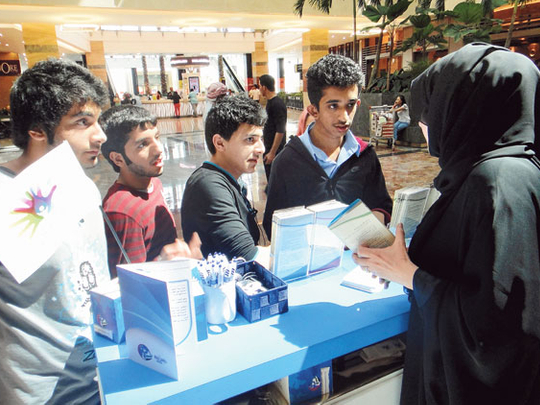
Dubai Most people might be able to offer a few words of advice on keeping diabetes or hypertension at bay. But how about propionic academia, cutaneous malignant melanoma, cri-du-chat syndrome and primary ciliary dyskinesia.
If these names don't ring a bell, that's because they are rarely discussed as they are diseases that afflict perhaps five people out of every 10,000.
If you believe you or your kin might be facing a health issue that's not easily identified, you can discuss the symptoms with two specialists — Dr Fatma Bastaki and Dr Fatma Al Jasmi — at Mirdif City Centre and Mall of the Emirates in Dubai Friday. The booths have been put up to mark Rare Diseases Day.
Celebrated annually on the last day of February, Rare Diseases Day serves as an awareness initiative in many European countries and the US to make policymakers aware about the realities of these diseases.
In the UAE, the Shaikh Hamdan Bin Rashid Al Maktoum Award for Medical Sciences organised a five-day campaign in malls to reach out to the public. More than 800 people have visited the booths and made enquiries so far.
"The [word] ‘rare' was attracting them. When they see ‘rare' they come and ask ‘What are the rare diseases?' Dr Fatma Bastaki, consultant paediatrics and clinical genetics specialist, said.
"Some of them had queries about certain diseases and we directed them to proper physicians for proper diagnosis and in some cases I gave them my diagnosis on the spot and scheduled an appointment for them."
There are more than 6,000 rare diseases which are often "chronic, progressive, degenerative, and often life-threatening", Dr Fatma said. Eight of ten cases of rare diseases have genetic origins and five out of ten cases affect children, she added.
"Each woman in the world, even if she has or doesn't have it in the family, has the risk of two to three per cent of giving birth to a child who is mentally handicapped or physically handicapped without cause. But consanguinity will increase this chance, it will double the risk."
While intermarriages between relatives is part of culture in most countries, including the UAE, Dr Farma said social perceptions had been changing of late.
"The new generation now are changing their attitude [about consanguinity] when they come to my clinic," she said.
More and more people are becoming interested in learning about their family health and history. School discussions have helped, too.
Yousuf Jamal, 16, a student of Dubai Arab American School, said: "It was actually our intention to come here yesterday because we were interested to know about the diseases that are rare. For example, when getting married you should know what diseases you have just in case, like to be careful."
In the UAE, there is no public registry for rare diseases. But the Centre for Arab Genomic Studies, a division of the Shaikh Hamdan Bin Rashid Al Maktoum Award for Medical Sciences, has so far catalogued at least 340 genetic disorders in Arab populations that fall under the rare diseases category.
The rare diseases awareness campaign concludes Friday. Get to Mirdif City Centre or Mall of the Emirates between 10am to 10pm if you would like specialists to put your doubts to rest.












